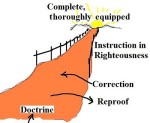Today in 1594 – William Kethe Died
Reformer John Calvin thought of the writing and singing of hymns as a dangerous liberty! In his opinion, it was like trying to add something to the Bible! For this reason, he promoted the singing of the Psalms of the Bible only, publishing poetic paraphrases of them in both French and English. One of these is a version of Psalm 100 called All People That on Earth Do Dwell.
The hymn is attributed to Scottish clergyman William Kethe. In a time of persecution, he was driven into exile in Geneva where Calvin was, along with John Knox, the Scottish reformer. There Kethe assisted in producing the Geneva Bible, a translation of the Scriptures. We have no absolute proof that he wrote the above hymn, but a number of early printings include his initials, W. Ke. The song says in part:
All people that on earth do dwell,
Sing to the Lord with cheerful voice.
Him serve with fear, His praise forth tell;
Come ye before Him and rejoice.
The Lord, ye know, is God indeed;
Without our aid He did us make;
We are His folk, He doth us feed,
And for His sheep He doth us take.
Some versions have “we are his flock” in the second stanza. Either fits Ps. 100:3. And it may in fact be a printer’s error that turned flock into “folck,” early on! The English language has changed somewhat in the 450 years since this hymn was written, but the priority of praising God remains. In the language of the original, “com ye before him and reioyce.”
(2) Today in 1840 – John Stainer Born
Knighted by Queen Victoria, Sir John Stainer was one of the preeminent church musicians of the Victorian era. An organist, a trainer of choirs, and a professor of music at Oxford, Stainer composed some 150 hymn tunes. He also produced the oratorio The Crucifixion in 1887, calling it “a meditation on the sacred passion of the holy Redeemer.” Its choral rendering of God So Loved the World is magnificent.
Note: I have a problem with the above rendition. Musically, it is well done, by a small choir (12 voices). But it seems someone felt it would be a waste of time simply to sit and meditate on these sacred words. They called for the ushers to collect the offering while the song was sung! There is perhaps some latitude for the use of instrumental music at such times. But not vocal music. If we are in that much hurry to get the service over with, omit the offering, or place a plate at the door. But how can those assembled focus on the text while fumbling in purses and wallets and passing offering plates? Fortunately, the ushers are out of sight of the video camera after a few moments. But I believe there is a lack of due reverence in this practice.
If you have never done so, try singing Mary James’s hymn All for Jesus to Stainer’s superior tune Wycliff.
All for Jesus, all for Jesus!
All my being’s ransomed powers:
All my thoughts and words and doings,
All my days and all my hours.
(3) Today in 1882 – O Love That Wilt Not Let Me Go written
This hymn was written by a blind Scottish pastor named George Matheson. On the day of his sister’s wedding, he thought about a painful experience known only to himself, one that had caused him great distress. We do not know for certain what this was, but the wedding may give us a clue. Years before Matheson himself was engaged to be married. But, with his rapidly deteriorating eyesight, he feared he’d be too great a burden on a wife. He wrote to his fiancé, releasing her from the pledge to marry him. (Other accounts suggest it was she who refused to be married to a “blind preacher.”)
It may have been the recollection of that heartbreak that caused Matheson to meditate on the love of the Lord that would never let him go. The Apostle Paul describes it this way: “I am persuaded that neither death nor life, nor angels nor principalities nor powers, nor things present nor things to come, nor height nor depth, nor any other created thing, shall be able to separate us from the love of God which is in Christ Jesus our Lord” (Rom. 8:38-39). The words of God to the nation of Israel are appropriate for Christians today as well: “I have loved you with an everlasting love” (Jer. 31:3).
O Love That Wilt Not Let Me Go is a song that was written on a sudden inspiration on the day of the wedding of George Matheson’s sister. He says, “I had the impression rather of having it dictated to me by some inward voice than of working it out myself. I am quite sure that the whole work was completed in five minutes.” The hymn begins:
O Love that wilt not let me go,
I rest my weary soul in thee;
I give thee back the life I owe,
That in thine ocean depths its flow
May richer, fuller be.
Here is a male chorus version that uses a tune other than the traditional one. The close harmonies, and the power of a massed choir are stirring.

